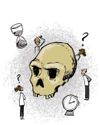Essayer OR - Gratuit
ANALYSIS - Why you should never take health advice from a 100-year-old
BBC Science Focus
|November 2024
Living longer is a goal for many of us. But should we be following the lifestyles of those that live past 100?

API RESPONSE
Centenarians – people who live to be 100 years old and over – were once a rare breed. But they've become increasingly common since the mid-to-late 20th century, thanks to improvements in diet, healthcare, and lifestyle. However, a recent analysis by the Office for National Statistics suggests that the number of centenarians in England and Wales may have peaked. In 2023, there was a 0.5 per cent decrease in centenarians compared to 2022, with the total falling from 14,920 to 14,850. This drop is thought to be tied to the decline of the post-WWI 'baby boom' generation.
How did so many people make it to this ripe old age? And can we learn from them to improve our chances of doing the same? It might seem logical to ask the oldest living people for their secret to longevity, but Dr Bradley Elliott, Senior Lecturer in Physiology at the University of Westminster, explains that this approach alone is unreliable due to a phenomenon known as survivorship bias (drawing conclusions from a group that has survived, while ignoring those who didn't).
Take Jeanne Calment, for example, who holds the Guinness World Record for the longest human lifespan at 122 years and 164 days. She often attributed her remarkable longevity to a relaxed and carefree lifestyle. She married a rich husband and never had to work, loved cycling, and continued to drink wine and smoke at a very old age.
So, should we follow her example? "Some people just get phenomenally lucky," says Elliot. "Studying the oldest individuals can provide insights, but a more reliable approach would be to study people in their 60s over the following decades to identify factors that contribute to longevity." "Health recommendations, such as the NHS guideline for 150 minutes of exercise a week, are based on decades of research. It's a process of gathering the best possible information from multiple angles to make informed health decisions."
Cette histoire est tirée de l'édition November 2024 de BBC Science Focus.
Abonnez-vous à Magzter GOLD pour accéder à des milliers d'histoires premium sélectionnées et à plus de 9 000 magazines et journaux.
Déjà abonné ? Se connecter
PLUS D'HISTOIRES DE BBC Science Focus

BBC Science Focus
PASS THE PLASTIC
All of us are ingesting microplastics. Could dietary fibre help us get it out?
3 mins
November 2025

BBC Science Focus
Finally... An EV worthy of your bedroom wall
Ferrari's new Elettrica could be the car that gets dyed-in-the-wool petrolheads to long for an EV. It could also be the car that reshapes the entire EV landscape
4 mins
November 2025

BBC Science Focus
THE PUDU
Just when you thought Bambi couldn't get any cuter, meet the pudu, the world's smallest deer. Standing little taller than a domestic cat, what it lacks in size, it more than makes up for in allure. Doe-eyed, button-nosed, with little legs and perky ears, this diminutive South American mammal looks like it has stepped straight out of a Disney film.
2 mins
November 2025

BBC Science Focus
60-year mystery of the fossil skull that baffled scientists may finally be solved
The Petralona skull was discovered in Greece in 1960, yet its origin has perplexed experts – until now
2 mins
November 2025

BBC Science Focus
Only 1% of the world is eating a healthy and sustainable diet
A major report found healthier diets could transform the food system
3 mins
November 2025

BBC Science Focus
COLD AND FLU SEASON
Nobody enjoys being stuck in bed sneezing and coughing the days away. But there are steps you can take to increase your chances of avoiding these winter ailments
4 mins
November 2025

BBC Science Focus
There's another diabetes in town, here's how to recognise it
Misdiagnosis rates for this rare type of diabetes could be complicating treatment for patients
5 mins
November 2025

BBC Science Focus
THE QUEST TO FIND THE EDGE OF THE SOLAR SYSTEM
NASA's newly launched IMAP mission is set to tell us more about the boundary between our Solar System and interstellar space than ever before
7 mins
November 2025

BBC Science Focus
WHICH VAPE FLAVOUR IS WORSE FOR YOU?
If you're trying to quit smoking, you'll have probably heard talk that switching to e-cigarettes - or vapes - is a healthier option. One study by researchers at University College London estimated that in 2017 alone, over 50,000 people stopped smoking thanks to their use of e-cigarettes.
2 mins
November 2025

BBC Science Focus
WANTED: GUT BACTERIA DEAD OR ALIVE
There are millions of bacteria living in our guts. There are millions of dead bacteria there too. And scientists are learning just how much potential the dead ones have to improve our health
7 mins
November 2025
Listen
Translate
Change font size
